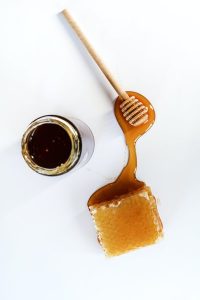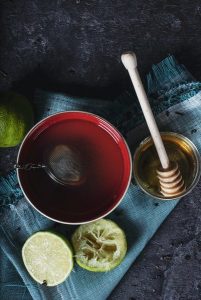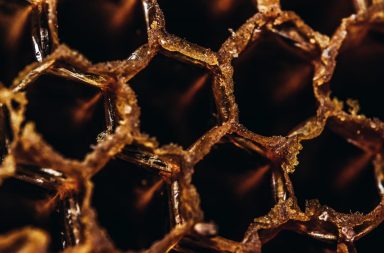Manuka honey can be used for a lot of things, and we mean a lot! But does Manuka honey have benefits for asthma?
For centuries, the endless properties of Manuka honey have been used to treat all kinds of ailments, including wounds and hay fever relief! In fact, even today we are using this sweet, sticky substance more and more – did you know you can use Manuka honey for brighter skin? Yes, really!
How to use Manuka honey for brighter skin
The question is, can this natural medicine really provide benefits to those who suffer from asthma?
Well, we’re going to look at whether asthma sufferers can really benefit from using Manuka honey, and if so, the best way to use Manuka honey to help relieve symptoms!
What is asthma?
Asthma is a condition that people usually suffer from long-term, however, some children may grow out of having asthma as they get older.
So, what exactly is asthma?
Asthma affects your airways, which are the tubes that your body uses to take air in and out of your lungs. The symptoms of asthma can be coughing, breathlessness and wheezing.
Unfortunately, for those that suffer from asthma, the condition is usually heightened by certain triggers, causing you to have an asthma attack.

Photo credit: Annie Spratt via Unsplash
But how can Manuka honey benefit asthma sufferers?
Well, first we need to look at what can trigger an asthma attack.
What can trigger an asthma attack?
Asthma triggers are usually something that you come into contact with that irritate your airways. This causes the airways to become inflamed, creating difficulty bringing air in and out of your lungs.
There are many common triggers for asthma attacks, including:
- Food allergies
- Animal allergies
- Mould or damp
- Exercise
- Dust mites
- Pollen and hay fever
- Cigarette smoke
- Stress
- Anxiety
So, how can you use Manuka honey to benefit symptoms of asthma?
Well, as you can see in the list above, asthma is often triggered, or made worse, by allergies.
Let’s look at what allergies are, and how Manuka honey may be able to play a part in relieving symptoms of asthma.
Asthma and allergies: how can Manuka honey help?
Asthma and allergies are hugely different conditions, however, the two can crossover.
Why? Because when you suffer an allergic reaction, your airways react to the trigger – whether that be pollen, dust or even cat hair.
Additionally, when your airways react to the trigger, they produce antibodies. These same antibodies can cause sneezing, coughing and even rashes – if you’ve ever suffered from hay fever you will be no stranger to the watery, itchy eyes!

Photo credit: Danika Perkinson via Unsplash
Unfortunately, for asthma sufferers, these same antibodies – the ones trying to help protect you from your allergy! – can also trigger an asthma attack.
As you can imagine – or perhaps you have experienced yourself – if you suffer from allergies, and asthma, this can be extremely difficult to manage.
Luckily, this is where the Manuka honey benefits for asthma may be able to help!
Manuka honey asthma benefits
So, what are the Manuka honey benefits for asthma?
Firstly, it’s important to remember that Manuka honey cannot treat asthma. In fact, anybody who suffers from the condition will have medication and doctor recommended methods for managing the symptoms.
The good news is, that Manuka honey may help to relieve the symptoms of asthma – and of allergies!
But how?
Well, the main benefit of Manuka honey for asthma is it may aid the prevention of coughing – one of the main symptoms of asthma.
When Manuka honey is ingested, on a teaspoon or in a hot drink, the sweetness of the substance helps produce saliva. The more saliva you are producing, the more lubrication is found in the airways, which in turn helps to relieve or reduce the need to cough.
Not only that, Manuka honey may also relieve the swelling and inflammation of the airways. This miracle substance is packed full of anti-inflammatories, properties which are found in the Manuka plant in which bees pollinate to produce the honey.
These anti-inflammatories may be able to help calm the inflammation of the airways that are caused by asthma – pretty amazing!
So, what are the best ways to use Manuka honey to benefit asthma?
We’re going to show you!
How to use Manuka honey to benefit asthma
Many asthma sufferers report symptoms such as coughing and wheezing, becoming worse at night time. This can cause disturbed sleep or trouble relaxing during the evening.

Photo credit: Gaelle Marcel via Unsplash
With this in mind, you may find using Manuka honey to help relieve symptoms is most beneficial in the evening.
So, what is the best way to try the Manuka honey benefits for asthma?
You can:
- Mix 1 teaspoon of Manuka honey with 8 ounces of hot water – you can do this up to 3 times a day which may provide relief from coughing.
or
- Mix 1 teaspoon of Manuka honey in warm water and add a squeeze of lemon juice – the acidity of the lemon juice may help clear mucus and could also act as an anti-inflammatory alongside the honey.
or
- Mix 1 teaspoon of Manuka honey with ½ teaspoon of cinnamon powder – these two combined may help reduce mucus and are best ingested before bed.
You can also add Manuka honey to hot tea, or even have a spoonful of the sticky goodness to help relieve sore throats.
Of course, the uses for Manuka honey don’t end there! Did you know you can make a DIY Manuka honey hair mask to keep your locks luscious? If you haven’t tried it already, we recommend you do!
How to: make a DIY Manuka honey hair mask
In fact, the benefits of Manuka honey really are endless. It’s certainly not hard to understand why this wonderful product of nature has been used by generations for centuries!
It is important to remember that Manuka honey benefits for asthma are not medically approved. If you suffer from pollen allergies or any other allergies it is better to get approval from your doctor before trying any alternative methods.


